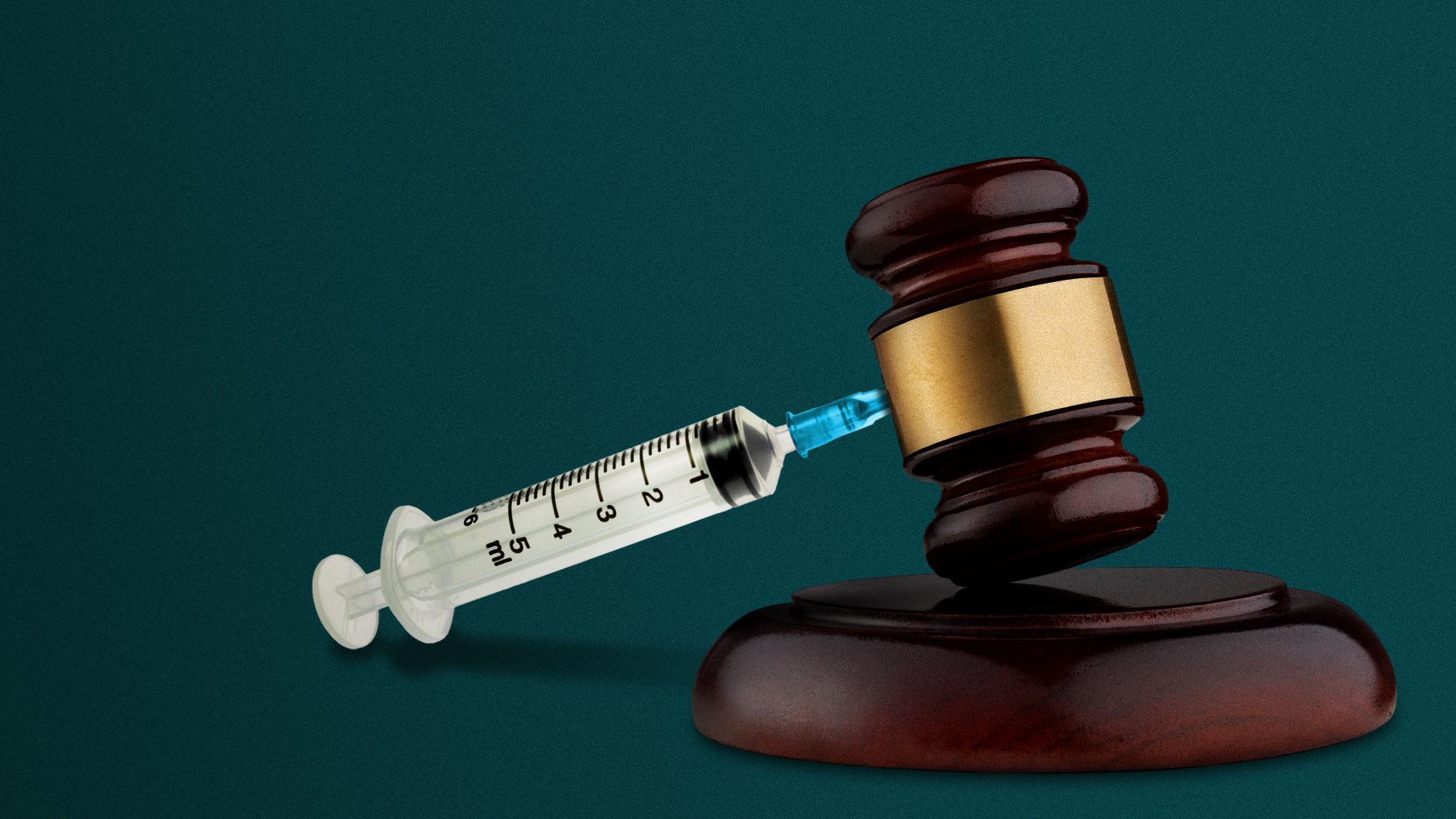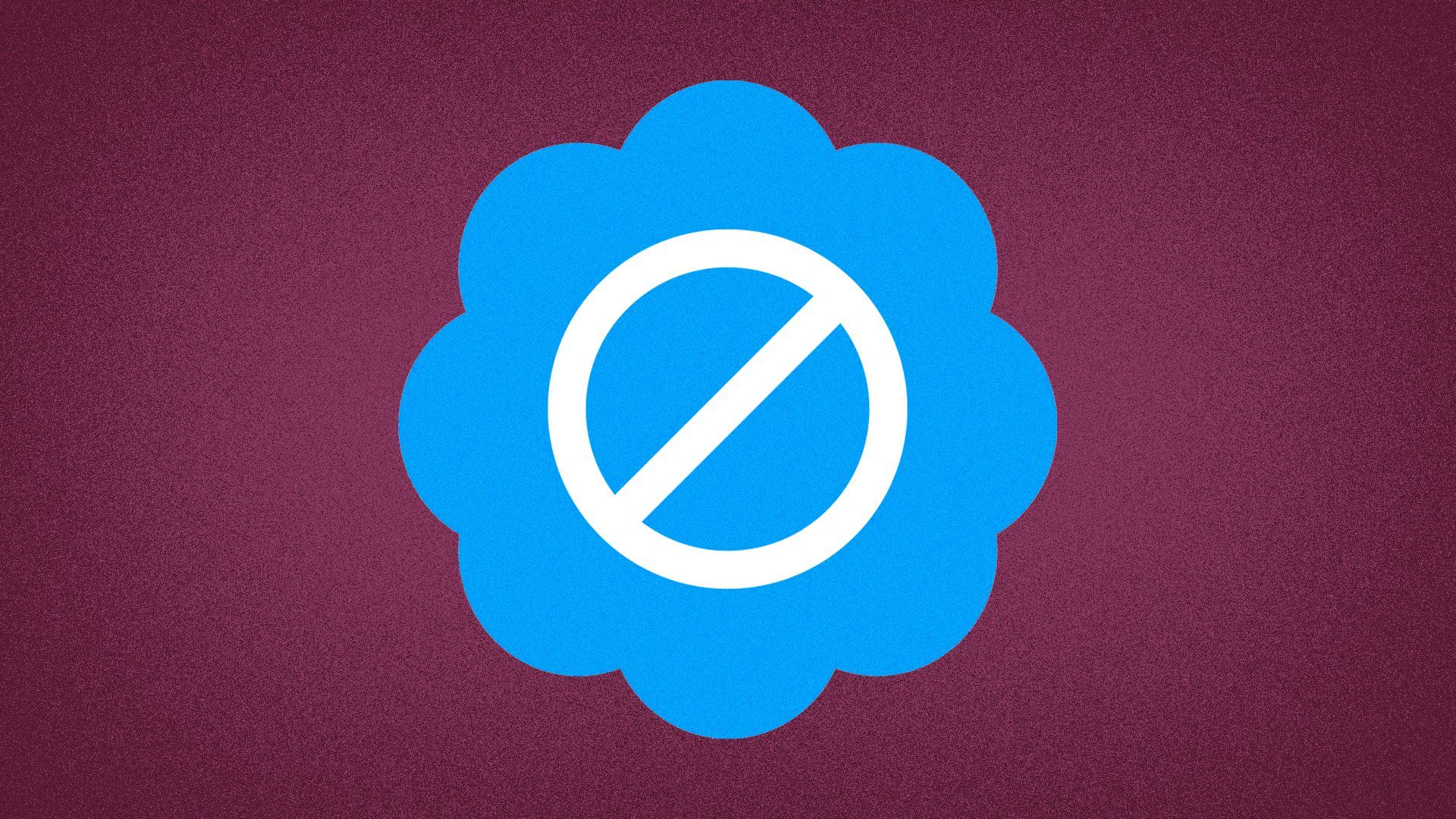| |
| |
| |
| Presented By Humana |
| |
| Axios Vitals |
| By Tina Reed · Aug 29, 2022 |
| Welcome back from the weekend, Vitals readers. Today's newsletter is 988 words or a 4-minute read. 🍺 On tap this week: Both the FDA and the CDC are expected to OK reformulated COVID-19 boosters. - And HHS is holding a meeting Wednesday to plan the transition of COVID-19 therapies and vaccines to the commercial market.
|
| |
| |
| 1 big thing: Why Moderna is suing Pfizer now |
 |
|
| Illustration: Gabriella Turrisi/Axios |
| |
| Moderna's unexpected patent infringement lawsuit against Pfizer-BioNTech over COVID vaccine technology says more about the future market for mRNA shots than the current pandemic, Axios' Adriel Bettelheim writes. The big picture: With the government's vaccine purchasing likely to drop off, experts see top manufacturers jockeying for customers and using the technology for other conditions. "Moderna looks at Pfizer's success as a threat to market share," said Jacob Sherkow, an authority on intellectual property and the life sciences University of Illinois' College of Law and College of Medicine. - "Filing suit may slow that down and be one way to ensure Moderna's share of product is going to remain a leader in this particular space."
- Moderna has said it is using its platform to develop medicines in four areas: infectious disease, cancer, rare diseases and auto immune disease.
- "They're trying to protect the franchise," Erik Gordon, a University of Michigan business professor, lawyer and expert on the drug industry, told Axios' Nathan Bomey. "They do want money — but I think the bigger money is money they hope to get in the future based on this platform."
Be smart: The company in legal papers filed Friday is not seeking monetary damages for sales prior to March 8, 2022 or asking for Pfizer's vaccine to be removed from the market. Nor is it seeking financial gains from vaccine distribution in 92 developing countries. - "We are filing these lawsuits to protect the innovative mRNA technology platform that we pioneered, invested billions of dollars in creating, and patented during the decade preceding the COVID-19 pandemic," Moderna CEO Stéphane Bancel said in a statement.
Go deeper. |
    |
| |
| |
| 2. Keeping up with the COVID variants |
 |
|
| Illustration: Aïda Amer/Axios |
| |
| The first updated coronavirus vaccines — and likely the last purchased by Uncle Sam — are about to become available across the U.S., and will ideally provide more targeted protection against the dominant strain that's circulating, Axios' Caitlin Owens writes. What's happening: The updated vaccines will go through the regulatory approval process this coming week, and the shots are expected to become available soon after — likely the week after Labor Day, according to a senior Biden administration official. The intrigue: The FDA has prioritized speed — which is necessary if the goal is keeping up with the virus' mutations — over having all of the data on how the vaccines work in real life. - The annual flu vaccine is updated using non-human data, so there's a precedent for the FDA's approach. Preclinical data suggests the shots elicit a strong neutralizing antibody response.
Yes, but: Some experts warn this risks dampening enthusiasm for the shot. What they're saying: "The FDA should be commended for wanting to take an aggressive, expedient approach," Eric Topol, executive vice president of Scripps Research, wrote on Substack. - "But we also need to acknowledge the uncertainties about efficacy and the response from the public," he added.
|
    |
| |
| |
| 3. HHS cybersecurity office overwhelmed |
| The federal office in charge of investigating cyber attacks against the nation's health system is far under-resourced and overwhelmed, Politico reports. Why it matters: Cybersecurity is a fast-growing, expensive problem for health providers and has begun threatening the safety of patients. - One cyberattack and data breach cost Tenet Healthcare $100 million in lost revenue and mitigation costs in the second quarter of 2022, HIPAA Journal reported.
- Last week, a French health system reverted back to pen and paper after it fell victim to a ransomware attack and hackers demanded $10 million.
What they're saying: The HHS Office of Civil Rights, which has been charged to lead the response, is operating on a shoestring budget. - Put it in perspective: "The office had a budget of $38 million in 2022 — the cost of about 20 MRI machines that can cost $1 million to $3 million a pop," per Politico.
My thought bubble: If cybercriminals have taught us nothing, it's that they have a lot to gain and so far, little to lose with these attacks. - Not devoting enough resources — and accountability — to finally push health care to catch up with other industries like banking stands to become a far more expensive and deadly problem.
|
    |
| |
| |
| A message from Humana |
| Members can save on quality care with Medicare Advantage |
| |
 |
| |
| Medicare Advantage can provide better health outcomes and lower costs. The proof: Members have a 43% lower rate of avoidable hospitalizations and savings of nearly $2,000 a year compared to those who choose fee-for-service Medicare. Learn more. |
| |
| |
| 4. Twitter's medical information problem |
 |
|
| Illustration: Maura Losch/Axios |
| |
| Twitter played an outsized role in disseminating public health information during the COVID pandemic, but it's coming under fire for the gatekeeping role it's had elevating — or quieting — qualified voices. The big picture: Recently, the accounts of multiple doctors, scientists, and patient advocates were suspended and factual health tweets flagged as false, the Washington Post reported. - Many of the tweets have since had the misinformation labels removed, and the suspended accounts have been restored, per the Post.
- "We acknowledge the mistakes made in these cases and are reviewing our team's protocol to safeguard against such mistakes in the future," Twitter spokeswoman Celeste Carswell said in an email to Axios.
Be smart: It's an example of the unwieldy challenge of conveying the most accurate information from authoritative voices during a global health crisis. - A recent study published in JAMA Network Open found Twitter's decision to reopen blue verification badges for trusted health experts early on in the pandemic may have ended up reflecting bias.
- Verified physician sources were far more likely to be male (71%) rather than female (29%), the study found. Americans were also overrepresented.
What they're saying: "This may promote what we already know in medicine which is male voices are promoted more, they're elevated more and they are given a bit more weight," said Fumiko Chino, a co-author and radiation oncologist at Memorial Sloan Kettering Cancer Center told Axios. Read the rest. |
    |
| |
| |
| 5. While you were weekending |
 |
|
| Illustration: Aïda Amer/Axios |
| |
| 👉 Black COVID long-haulers felt invisible to the health care system, so they formed their own support groups. (NBC News) 🏥 It wasn't surprising to many experts that Amazon is planning to shut down Amazon Care in the wake of its planned acquisition of primary care company One Medical. Now, they say, we should be watching for more health care acquisitions. (CNBC) 💰 The U.S. government plans to pause free at-home COVID tests by Sept. 2. (Axios) |
    |
| |
| |
| A message from Humana |
| Older Americans are choosing Medicare Advantage |
| |
 |
| |
| Medicare Advantage can help provide better health outcomes and lower costs. With Medicare Advantage, members see a 43% drop in avoidable hospitalizations and save nearly $2,000 a year compared to those who choose fee-for-service Medicare. Learn more. |
| |
 | | Why stop here? Let's go Pro. | | |
No comments